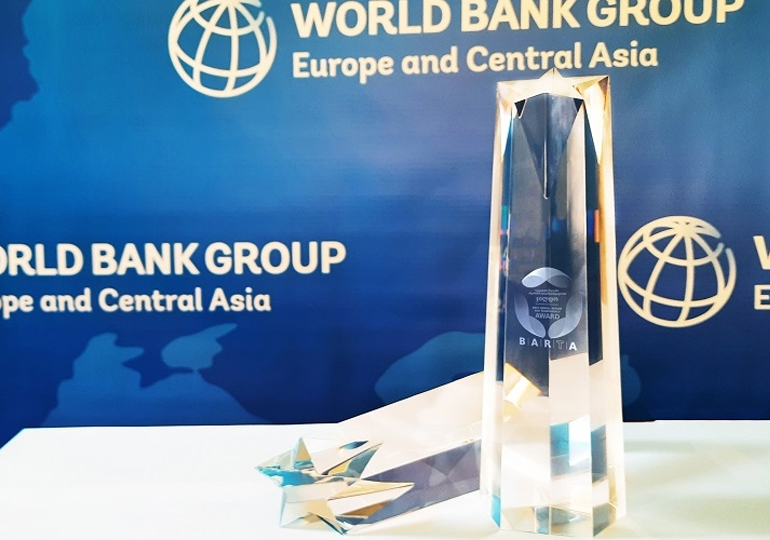The Oscars conjure up images of glamorous actors and actresses, paparazzi, and fashion on the red carpet. But in Georgia, a different kind of Oscars is creating its own buzz and generating real impact on Georgia’s business culture and investment potential.
The Best Annual Reporting Transparency Awards (BARTA) – the region’s first ‘Transparency Oscars’ -launched in 2019. This annual event has put a spotlight on corporate financial disclosures and business transparency, helping to support an emerging culture of transparent annual reporting and encouraging businesses to adhere to higher accountability standards – a necessity for creating a business environment attractive to foreign investment.
The BARTA 2021 Awards were held in Tbilisi in December and were broadcasted live on national TV. The Governor of the National Bank of Georgia opened the awards ceremony, which was presided over by a distinguished international panel of judges representing the business community, government agencies, international financial institutions, and academia. The competition was open to all public interest entities (PIEs), including traded companies, banks, insurance companies and state-owned enterprises (SOEs), all of which were allowed to self-nominate. The 2021 awards showcased 18 nominees, who were selected through a process conducted through a robust methodology, which emphasized, among other things, the provision of non-financial information that addresses intangible assets such as brand, customer reputation, know-how, and goodwill that drive corporate value.
BARTA 2022 will take place this December, and businesses are expected to participate more actively this year. And the award continues to evolve. As sustainability has emerged as a priority, the 2022 competition will have two new award categories for sustainability reporting.
The Road to BARTA: From Reformer to Performer
Over the past decade, Georgia has carried out extensive tax, customs, anti-corruption, business environment, governance, and financial sector reforms, which have all played a crucial role in determining the country’s economic growth and been reflected in Georgia’s positioning in international rankings.
The increase in Georgia’s financial transparency is largely due to a combination of sound legislation and the launch of the online platform reportal.ge, which revolutionized access to company financial information that until recently was completely opaque. This platform, developed by the Georgian Service of Accounting Reporting and Audit Supervision, has been widely recognized and heralded by international rating agencies, think tanks, the business community, and academia.
These comprehensive reforms in corporate financial reporting and business transparency were undertaken by the Georgian Government over the past six years with World Bank assistance and generous support from the European Union (EU) – first, through the regional Strengthening Auditing and Reporting in Countries of the Eastern Partnership (STAREP) program and later, through the Georgia Financial Inclusion and Accountability Project. Subsequently, BARTA was launched in 2019 under a joint World Bank and EU project and is conducted in partnership with the National Reforms Support Foundation (RSF). BARTA was created to encourage the development of high-quality corporate reporting beyond boilerplate and to introduce the concept of narrative reporting to the wider array of stakeholders.
Why Corporate Governance Matters
Transparency and disclosure are key elements of a strong corporate governance framework, providing the foundation for informed decision making by shareholders and potential investors. As successful businesses demonstrate, good corporate governance helps firms operate more efficiently, mitigate risk, improve access to capital, and safeguard against mismanagement. When implemented by a large number of businesses in a given country, sound corporate governance practices also encourage new investments and contribute to economic growth.
Nearly two decades ago, corporate governance was almost unknown in Georgia. Today, the concept is widely recognized and appreciated, with more companies understanding its importance. Meanwhile, three corporate governance codes have been enacted in the country: for banks, for issuers, and for SOEs.
BARTA is a tool for promoting this concept and awards companies that are leading the way in preparing timely and high-quality annual reports, encouraging other entities to follow suit, while creating healthy competition to tell a better corporate story.
Improved Business Environment = Greater Investment
International partnership and collaboration are essential for Georgia to keep up the momentum for reform. During some of Georgia’s most difficult years, international partners such as the World Bank and the EU have helped the country establish and maintain macroeconomic stability and foster growth. And that synergy between international donors and Georgian stakeholders produced an invaluable tool in BARTA, one that should serve as a model for other countries in the South Caucasus and the wider region.
Even in the face of the pandemic, the Transparency Oscars has expanded and sustained business interest. Georgian companies continued to show resilience and even managed to improve the quality of reporting in the hopes of winning a BARTA Award, thereby strengthening their reputation as a trusted company, and attracting more publicity
All of this gives us reason to be optimistic that transparency and the quality of annual reports will only continue to improve. Over time, this award ceremony will spur greater trust in companies’ disclosures and information, enabling informed decision making by investors.
This progress has not always been easy, but with a strong vision for the future – by making steady advances and celebrating small wins, such as BARTA’s success – Georgia is confidently transitioning into a more transparent, credible, and attractive country for doing business.
Originally published on World Bank Blogs: Georgia’s Transparency Oscars: Encouraging healthy competition to advance accountability (worldbank.org)



















